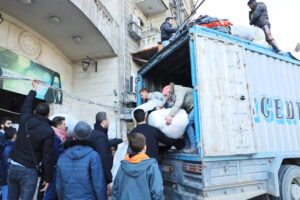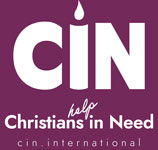Aleppo – On February 6, two quakes with a magnitude of up to 7.7 shook southeastern Turkey and northwestern Syria. Syrian agencies recorded a total of more than 60 aftershocks within 24 hours. In Aleppo, around 200,000 people have lost their homes and apartments as a result of the quake. Aleppo is only about 70km from the epicenter of the quake, but it is like being in another world.
On March 3, the Pope’s special envoy, Archbishop Gugerotti, reported from the earthquake zones in Syria. He expects tens of thousands more dead. In an interview with “Vatican News,” he described the situation in Syria as “almost hopeless. It’s almost impossible to bring aid to the country, which has been largely destroyed by war and earthquakes.”

Distribution of warm blankets
For a long time, hardly any aid supplies or relief workers came to Aleppo. While international aid was slowly starting to arrive in Turkey, the people of Aleppo were left to fend for themselves. The helpers of the Civil Defense, the so-called White Helmets, can hardly fall back on heavy clearing equipment.
They mostly use shovels or their bare hands to dig for buried victims. By 2017, the civil war and the “Islamic State” had already destroyed about a third of Aleppo and razed entire neighborhoods to the ground.
The earthquake is now also destroying the buildings that remain whole. In particular, the ancient houses in the old city, which had still been built without reinforced concrete, collapsed like houses of cards, burying the residents underneath them. Tens of thousands of victims are still believed to be buried under the rubble. People are left to fend for themselves.
The churches are helping as best they can.
After all, the survivors have been left homeless in the biting cold of winter. They are given refuge in monasteries and churches. Warm blankets and clothing are urgently needed. It may be months before they can return to emergency shelters or rebuilt homes. It is a matter of survival for a better future. Occasionally, at least Muslims find shelter in mosques. Churches and monasteries open their doors to all people without distinction.
Christians in Need helps through direct contacts. Sometimes it is adventurous how donations can be brought to Aleppo. But the church’s network is extensive. In addition, we are in direct contact with the Syrian Orthodox Archbishop Mor Boutros Kassis. Initially, we were able to protect people from the cold with warm blankets and clothing. More than 3,000 people are finding shelter in the church and parish halls.
With our donations, the scouts of the Syrian Orthodox Church were able to set up a field kitchen that serves 1,500 portions a day to the earthquake victims who have become homeless.
Archbishop Boutros expresses his heartfelt thanks to all donors! On our homepage christeninnot.com you can find two videos of the distribution of the blankets and the field kitchen of the scouts (0cn.de/aleppo).
Refuge in Christian villages
Many Christians who have lost their homes and escaped with their lives are seeking refuge outside the city. In Homs, there is a region with many villages and towns called Wadi Alnasara. There, many earthquake victims have been taken into houses or quartered in empty houses or apartments. This way they at least have a roof over their heads and protection against the cold. There they can stay until the reconstruction.
The families who stay behind have to bury the dead. There is a threat of diseases such as cholera. And somehow life has to go on.
Sustainable help for survival in the cold

Warm food and denser accommodation with the sisters
In addition to initial aid, CiN also supports religious congregations. The religious community of the “Servants of the Lord and the Virgin of Matará” (SSVM) helps around 150 people seeking protection. In their religious house, these people find refuge and help. And CiN makes it possible to provide three meals a day.
A young lawyer, who belongs to the family of a Syrian Orthodox parishioner in Vienna and who has just received his license to practice law in Syria, is staying with the sisters and is now organizing care for the earthquake victims. The direct contact to Aleppo makes our help possible. The good contacts of CiN to Syria (so also for the refugees in Qamishli) prove themselves also in this emergency situation. Thus, help arrives directly. The immediate need is alleviated with blankets and warm food rations. But much more important is that the Christians in Aleppo become aware of the solidarity of Christians worldwide. They know: We are not alone. Our future begins today. In the midst of the rubble. But full of hope that the Good Friday of death will be followed by the Easter Sunday of life.

